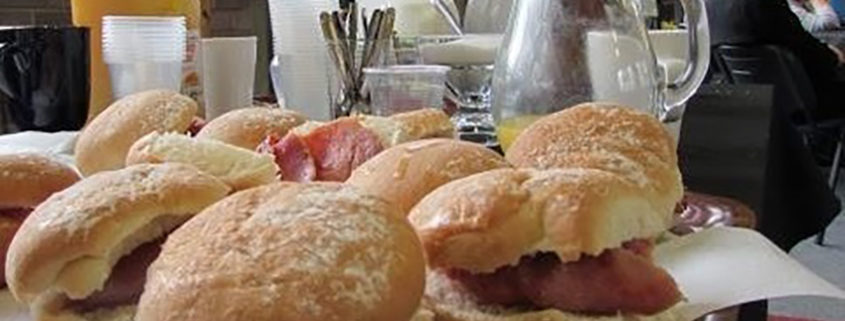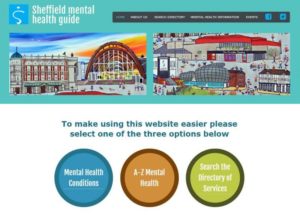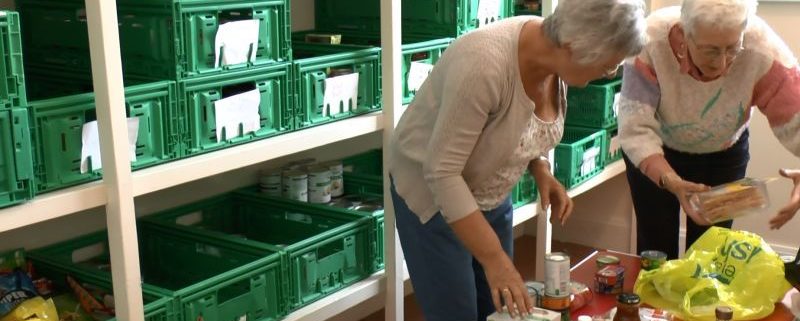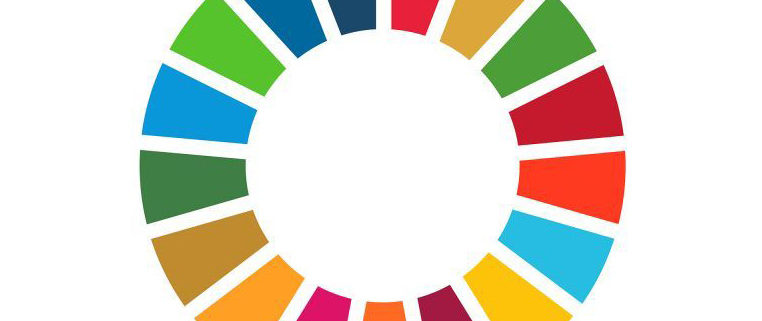Bishop Steven’s address to Diocesan Synod in March 2022, focusing on the atrocities in Ukraine and our call to be a more Christ-like Church.
Posts
When was the last time you thought about mental health and young people?
There is a major issue. As many as 1 in 10 children and young people (aged 5-16) have a clinically diagnosable mental health problem. The problems include depression, anxiety, and conduct disorders. The problems are often linked to what is happening in their lives.
Last month I attended the annual Civic Breakfast organized by Church Action on Poverty in Sheffield.
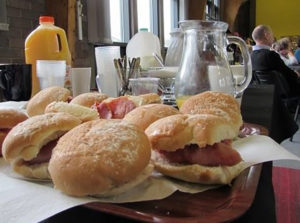 This is an annual event which brings together Church leaders and faith leaders across the city with local councillors, heads of services, MPs and charities.
This is an annual event which brings together Church leaders and faith leaders across the city with local councillors, heads of services, MPs and charities.
The subject this year was the connection between mental health and poverty. Common mental health problems such as depression and anxiety are distributed according to a gradient of economic disadvantage across society. The less well off you are, the more likely you are to suffer from a range of common mental health problems.
We had a moving presentation at the breakfast from a woman in her twenties who described the mental health problems she experienced as a teenager, the care she received and the real difference it made. In the discussion which followed, several people contributed stories from their own families. We had expert opinion from people who work as advocates for those with mental health issues and from General Practitioners.
The most striking statistic was this (from a mental health commissioner):
“Mental illness accounts for 25% of mortality and morbidity in Britain but only 11% of the NHS budget is spent on these issues”.
We are not tackling this part of the problem. During the last parliament, funding for mental health services were cut by 8.25%.
It’s impossible to read the four gospels and not be aware of Jesus’ compassion for those who are suffering and his care for the whole person. In the first chapters of Mark, Jesus heals a man with an unclean spirit, a multitude in Galilee, someone declared unclean by his society, a man who is paralysed and full of guilt, another multitude by the lakeshore and a man with a withered hand. Read on further and you will find that Christ ministers to children and young people and the elderly with both physical and spiritual diseases. The gospels do not have our vocabulary for mental illness but it is impossible to read them and not find evidence of these conditions and of Jesus’ care for those who have them.
What can we do?
Christians and Christian congregations can help by raising awareness of mental health issues, especially among the young. We can help by listening to one another: the first line of support and help. We can help by reducing any stigma around mental health so that people feel able to talk about the problems they may be facing, whether that is anxiety or depression or another serious illness. When was the last time you heard a sermon or a presentation in church on these issues?
We can help by taking seriously our responsibility to care for the young and invest in children and young people. It is encouraging to see the number of workers employed in our Centenary Project increasing month by month. If you are part of a church in this Diocese, has your church explored this project yet?
We can help by working to relieve poverty and suffering, both in acts of kindness and charity and in our campaigning for justice. Part of that campaigning will be working to ensure that mental health support increases rather than decreases year by year in line with other spending on health.
We can help by offering our time and gifts through the Samaritans, to Mind, in local visiting and support for those in need.
The Civic Breakfast helped open my eyes and ears again to the fragility of many young people and the need for care and support. As followers of Jesus Christ, let’s take care to be informed and compassionate and involved.
+Steven
- The Sheffield Mental Health Guide has details of events, services and information particularly of relevance to people in Sheffield- http://sheffieldmentalhealth.org.uk/
- The Mental Health Association have lots of helpful advice for anyone struggling with mental health issues- https://www.mentalhealth.org.uk/your-mental-health/getting-help
- Samaritans are available by phone to listen to anyone who is struggling with mental health at any time, day or night – http://www.samaritans.org/
- A useful website, for children and young people and their carers- http://www.youngminds.org.uk/
Lent begins tomorrow. It’s the time of year when Christians give something up – usually food – or else take something on for the sake of others.
Let me tell you a true story for the beginning of Lent about kindness and practical help.
Sohail Mumtaz is a leader of the Muslim Community Association in Sheffield. Last year, during Ramadan, he challenged one of his friends, Lee Ward, to have a one day fast.
Lee fasted and the experience of going hungry for a day made him think of the children in his community who are hungry. These are the people who are regularly helped by the S2 Foodbank. The Muslim Community Association and the churches both provide food and funding for distribution.
Lee and Sohail are taxi drivers. They wanted to do something more to help the children of their community. They approached other taxi drivers across the city. Together they raised the money and gave the time to take 96 parents and children to Cleethorpes for a day at the seaside in September. Many had never been to the coast, and most had never had a holiday
Deni Ennals, the Foodbank co-ordinator, organized the trip. Friends and neighbours donated car seats for children, buckets and spades, sun hats, lotion, items for the picnic and cash for fish and chips. Every family was given some spending money for donkey rides and the fairgrounds. Everything went without a hitch. The day was a huge success.
Deni wrote afterwards to say thank you to the foodbank supporters: “This one day away from the drudge and poverty of their normal lives did more for many of our clients than any antidepressant many have been prescribed. It’s a shame we could not bottle the fun and laughter and bring it home to help them through the winter months, when many will not only experience food poverty but also fuel poverty, where homes will have no heating and cooking facilities will become a luxury”.
As far as we know, there are 50-60 Food Banks across South Yorkshire and the Diocese of Sheffield. It would be excellent if none of them were needed but all of them are. Most of them are connected to churches and to other faith communities who supply volunteers and donations of food. A wide range of community groups support them.
Most clients don’t use the food banks regularly but a very wide range of people have to use them from time to time. Recent research on provision in the Diocese can be accessed in the Feeding Britain Sheffield Diocese Report. The findings link to the All Parliamentary Group on Hunger’s Feeding Britain Report which can be found here.
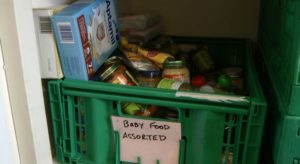 Why do people need food banks in modern Britain? We have food in abundance – enough to waste in most of our homes. There are many different reasons but top of the list in every survey are delays or errors in paying benefits, problems with disability benefits, or the application of benefit sanctions (where payment of a benefit is delayed or stopped because a claimant has not met certain conditions). People may be out of work, or they may be in very low paid jobs. Most commonly, people use food banks when there is some unforeseen crisis in their lives.
Why do people need food banks in modern Britain? We have food in abundance – enough to waste in most of our homes. There are many different reasons but top of the list in every survey are delays or errors in paying benefits, problems with disability benefits, or the application of benefit sanctions (where payment of a benefit is delayed or stopped because a claimant has not met certain conditions). People may be out of work, or they may be in very low paid jobs. Most commonly, people use food banks when there is some unforeseen crisis in their lives.
It is important to understand that something can be done about most of these reasons. Next week the General Synod will debate the impact of benefit sanctions. The Diocese of West Yorkshire and the Dales have brought a motion to debate. Malcolm Chamberlain, Archdeacon of Sheffield and Rotherham, will put a “friendly” amendment to the motion on behalf of this Diocese to strengthen its impact, calling on the government “to initiate a full independent review of the impact and efficacy of the sanctions and conditionality regime”. The background papers for the Synod debate are GS 2019A Impact of Sanctions on Benefits Claimants and GS 2019B .
But back to Lent and giving something up. How can we help, today? All Christians at this time of year are encouraged to fast in some way and offer practical support and help to those around us.
- Foodbanks across the Diocese are looking for support and help: volunteers, supplies, practical aid of all kinds. It may be that your own local church is already supporting a foodbank. If it’s not, can you connect with one?
- Foodbanks are even more effective when they build community, treat people with respect and help and support them in other ways. The Sheffield taxi drivers are an example to us all. What can you and I do to help?
- Recent research suggests that foodbanks help more people when they make advice available within the foodbank on benefits, on money management, on debt. This already happens in some foodbanks in Sheffield (including S2) but needs to spread to more.
- Food waste is a massive scandal in modern Britain. What can we do to reduce the amount of edible food we throw away? If you’ve not seen it yet, I can recommend the excellent documentary by Hugh Fearnley Whittingstall, “Hugh’s War on Waste”
- Foodbanks are needed because there are holes in the net of welfare provision. It’s important for churches and others to lobby government to mend the nets so that no-one, and especially no child, goes hungry. There is more on that in this report from the Church Action on Poverty http://www.church-poverty.org.uk/safetynet
Lent is a time to pause, to slow down, to reflect on our lives, to connect more deeply with God and with our neighbours. As you give something up this year, take time to help others who do not have enough.
+Steven
Lonely planet. 149 million kilometres from small star, on edge of galaxy, rich and full of potential. Afraid (sometimes). GSOH (sometimes). Looking for long term relationship. WLTM saviour.
There are three great truths at the heart of the Christmas story. The first is that humankind needs help. On our own we mess things up very badly indeed.
At the end of 2015, that’s not hard to understand. Look around you. The news has been dominated this year by the migrant and refugee crisis in Syria. Millions of people are on the move. There have been acts of terrorism around the world and on our doorstep: all of them man made. We have polluted the world we live in. Humanity’s greed and selfishness is now affecting the climate and the weather in ways which will affect our children and grandchildren. Yorkshire’s industrial base has declined further this year with the end of deep coal mining and the redundancies in steel. We have terrible examples in our own communities of the way in which people hurt the innocent for their own gratification. The gap between rich and poor in our own country grows ever wider. Many families are fractured. Many are lonely. Many lives lack direction. Who can say we do not need help?
It takes real courage to face these issues. Christmas should be a time when we open our eyes and ears and see the suffering and the pain in the world. Instead it’s become a time when we distract ourselves with food and drink and gifts and pretend everything is fine. Consumption becomes a kind of anaesthetic to deaden the pain we see around us. We cover up our problems for a while and hope they will go away. But that will not happen.
The second great truth is that God really has come to help us. The name Jesus has a special meaning. It means “God saves”. The angel says to Joseph, “You are to name him Jesus, for he will save his people from their sins”.
The world of Jesus day was expecting a different kind of saviour. They were looking for a powerful king, a mighty general, a wise politician who would establish a new government. This is the kind of saviour people still seek today.
Instead God came as a human child, born into an ordinary family. God came in humility and love in a way that everyone could understand. God did not come to the rich and powerful but to the poorest shepherds, to the refugees, to the children. God did not come to establish a new government in a single place and a single time but to offer change and new life to every person in every place in every generation to come.
God became a person to demonstrate his love for the world. God became a person to show us the immense worth and potential of every human life. God became a person to show everyone on earth how to live well: to live with kindness and purpose and grace, to live for others.
Jesus was a real figure in history. He is not made up. He is not a myth. Jesus was born in Bethlehem, an actual place. We set our calendars, still, by his birth. Christians believe Jesus lived a perfect life. But the world cannot tolerate this much goodness and light. He was crucified in his early thirties. Christians believe his death has an immense meaning: through his death on the cross, humankind is set free from all that we do wrong, through his death we can be forgiven. Christians believe that God raised Jesus from death on the third day. In his new life there is new life for everyone.
This brings us to the third great truth of Christmas. This story we tell has the potential to affect every human life, every family, every village, town and city and every nation on earth. This is history which changes us and history which can change the world.
Earlier this year my first grandchild was born. His name is Josiah. When I held him for the first time, something inside me changed. My heart softened. My perspective on time changed. I became determined to be there for him if I could and to be the best grandfather I could be.
That’s a small example compared to what happens when a person becomes a Christian. Christians believe that the living Christ enters into their heart and life. Change begins to happen from the inside out. There is new purpose and a new beginning. Christians don’t become perfect overnight (or ever, this side of heaven). But there is real change and the change inside begins to make a difference outside. We start to join in God’s great change agenda for the world: to work for peace, for justice, to break down isolation, to care for God’s world.
At the end of one year and the beginning of another, remember these three great truths: humankind needs help. God really has come to help us. The story of Jesus has the potential to change every human life and to change this world.
A very happy Christmas to you and to your family
+ Steven Sheffield
As churches across the Diocese prepare to celebrate Harvest it’s worth pausing to think about a momentous event in world history which took place last week at the United Nations.
World leaders gathered from every continent at the United Nations in New York. The purpose of the meeting was to agree the new Global Goals, or the sustainable development goals for the next 15 years.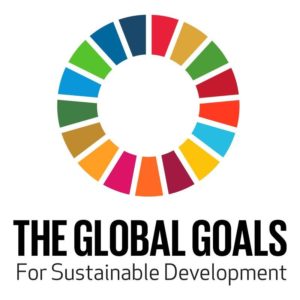
The media didn’t give the occasion that much attention. ITN led that night with Pope Francis’ visit to the 9/11 memorial rather than his time at the United Nations.
But it was a really significant moment. Fifteen years ago, the United Nations agreed the Millennium Development Goals. They were shorter, simpler and very effective. The MDG’s have had a huge impact in helping to reduce extreme poverty, improving health and education and in helping women and girls across the world.
The new Global Goals have emerged from an international three year process of listening. The UK government, led by the Prime Minister, played a really key role.
There is huge ambition here. According to the UN document: “Never before have world leaders pledged common action and endeavour across such a broad and universal policy agenda”. And again, “We can be the first generation to succeed in ending poverty just as we may be the last to have a chance of saving the planet”.
The goals are more comprehensive this time. There are 17 goals and 169 targets. They are therefore less catchy but much more realistic. They recognize that all kinds of things are interconnected in tackling poverty. They are also goals for every country not simply for the developing world. The British government has promised to implement them alongside governments in Africa and Asia. There is a much stronger emphasis on building strong, honest, robust governments and institutions as well as on aid and generosity. There is a strong slogan which focuses on helping the weakest so that no-one is left behind.
There is now a massive challenge ahead in bringing the new Global Goals to the attention of the whole world. I hope parishes and schools across the Diocese will play their part in that process.
As we celebrate Harvest together as Christians, we give thanks to God for the good things of the earth. We will focus on sharing what we have and on the care of creation. It is a good moment to remind each other of the new Global Goals and this common vision to end poverty once and for all.
For more information see https://sustainabledevelopment.un.org
+Steven
How are we to respond as human beings, as Christians and as a Church to the plight of refugees and migrants across Europe?
The pictures on our screens over the last few days have been heart-rending. Many of us will have been moved to tears. But how do we translate this outpouring of compassion into action and help others to do the same? What should we do?
One of the deepest truths in the Bible is that God blesses people so that those people in turn can become a blessing to others.
God calls Abraham in these words: “I will bless you…so that you will be a blessing”. God calls Jacob with this promise: “All the families of the earth shall be blessed in you and in your offspring”.
When God blesses us it is not for our benefit alone. When God blesses us we are not to feel special. We are not to hoard those blessings and keep them to ourselves. We are blessed so that we might bless others – all the families of the earth. Everyone.
As a country, we have not been blessed with peace and security and wealth and peace for our own benefit alone. Safety is given so that safety and a future can be shared. We are called as a country to be open handed, open hearted, to give a home to those in greatest need, to carry relief and fresh vision to countries whose heart is ripped apart by war. We are called to find room.
There has been an outpouring of compassion following the tragic deaths of Aylan and Ghalib Kurdi on 2nd September. In response the Prime Minister announced yesterday plans to take in 20,000 refugees from the camps in and around Syria over the next five years.
This is a good beginning and a significant shift. It is in addition to the immense contribution Britain is already making to relief in Syria. But it can only be a beginning to Britain’s response to this crisis.
David Cameron refers to the extraordinary compassion of the British people. I don’t believe the Prime Minister has yet understood fully the extent to which people want Britain to play its full part in addressing the situation in Europe.
I met last night with Faith Leaders across the city of Sheffield and this morning with church leaders of different denominations. Our communities are united in compassion for the plight of the refugees. We are united in the belief that Britain can and should do more. The faith communities stand ready to help in partnership with local and national government in welcoming those who find a home in our communities whatever their faith and country of origin. Sheffield was the first City of Sanctuary in Britain and remains in the front line of welcoming strangers.
I have written to the Prime Minister today, urging him to offer leadership in two ways: to support Britain playing its full part in offering sanctuary to those now on the move in Europe as part of a European wide settlement and to encourage new international initiatives to resolve the conflict in Syria which is the root cause of this migration.
Many Christians and local churches have already begun to do more. I’ve listed below some of the local charities and national agencies which are channelling help to refugees.
Please translate this outpouring of compassion into action through gifts and support for some of these initiatives. There is no need to wait until a new wave of refugees arrive. Charities in the region are already hard at work helping people in need here and across Europe and the Middle East. Please encourage local and national government that, as a country, we support a bigger, more generous response still to one of the great crises of our age.
- Christian Aid – Giving practical aid and support to refugees and asylum seekers www.christianaid.org.uk
- Oxfam – Supporting refugees in the Middle East and also in Italy and parts of eastern Europe www.oxfam.org.uk
- Secours Catholique-Caritas France – A French Roman Catholic agency specifically supporting refugees in Calais www.donenligne.secours-catholique.org
- ASSIST Sheffield – Helping refugees and asylum seekers in the Sheffield area; welcomes both donations and volunteers to help in this work including conversation clubs in Sheffield and Doncaster www.assistsheffield.org.uk or 0114-275 4960
- Project Paddington – “Children helping children” – initially set up to send teddy bears to children of refugees; also accepting donations in co-operation with TEAR Fund. Web-site under construction. E-mail: projectpaddingtonuk@gmail.com
- Rotherham Cares – Collecting clothes and other items at St Mary’s Roman Catholic Church, Herringthorpe Valley Road, Rotherham www.facebook.com/rotherhamcares
- Calais People to People Solidarity: Action from Sheffield – Organising and facilitating solidarity from Sheffield to Calais www.facebook.com/groups/CalaisMigrantSolidarityActionFromSheffield
- Sheffield Aid to Refugees – Organising aid to refugees in Kos and Lesvos www.facebook.com/groups/708657839266597
“Seek the welfare of the city…” 18th July 2015
“Is not this the carpenter? Mark 6.2
Two weeks ago a heart of steel was unveiled in the centre of Rotherham, outside the Minster. The new heart is the first deposit of a major new landmark sculpture for the South Yorkshire region: the Yorkshire Man of Steel.
The Yorkshire Man of Steel will sit, 30 metres high above the M1 motorway next to the Tinsley Viaduct and above a new visitor centre. The aim is to create a symbol of identity for South Yorkshire: to honour “the people and places that forged a lasting global legacy in coal, steel and manufacturing in this region and to signpost the new technologies that will secure the region’s future success”[1]. It’s a worthy aim and a bold statement.
But the Man of Steel will also ask a number of questions as he sits high on his podium looking over South Yorkshire.
- What is the future of work in this region and across the world?
- What role will work play in human life with the rise of technology and automation?
- How can we help the people of this region prepare for a new world of work?
Work is never far from the news headlines. On Thursday, Tata Steel announced 720 job cuts from its UK business because of high energy costs. The losses are mainly in Rotherham. The budget a few weeks ago turned around the question of work: the living wage; the reductions in welfare; the move to increase Sunday trading; the measures to support business; the questions about productivity; the aspiration to offer a living wage. Technology is asking new questions about our working lives all the time.
The Church has a vital part to play in this conversation. We believe that Almighty God took flesh and came to live among us. Jesus lived most of his life not as a religious minister or teacher but as a carpenter, honouring skilled, manual labour. The first disciples were fishermen: they worked with their hands and they ran small businesses.
We have much to give to a conversation about work. There is a rich Christian understanding of the place of work in human life found in Scripture and the Christian tradition. This understanding is rooted in the distinctive understanding of what it means to be human. Women and men are never simply units of production. People are created in the image and likeness of God. Each person is of infinite value. We were created to be creative: to find satisfaction and fulfillment in our work. For the Christian, work is more than paid employment. It embraces the work of nurturing and caring for a family, voluntary work in the wider community, the creativity of hobbies or the arts.
Work is important but it is not the whole of life. The notion of Sabbath plays a vital role in both the Jewish and the Christian tradition. God gives to us time to rest as well as time to work. Rest is vital not only for recreation but also for reflection, for looking back at what we have done, to give satisfaction and meaning to our lives. One of the greatest gifts the Church has to offer the contemporary world is the gift of Sabbath and of a holy day, of one day in seven set aside for the worship of God, for rest and for reflection.
Pope Francis has recently written a letter to every person on the planet about the care of the earth, our fragile common home. Central to his argument is his reflection on the future of work and the value of work:
“We were created with a vocation to work. The goal should not be that technological progress increasingly replace human work for this would be detrimental to humanity. Work is a necessity, part of the meaning of life on this earth, a path to growth, human development and personal fulfillment.”[2]
“Business is a noble vocation, directed to producing wealth and improving our world”[3].
Work and the future of work are a vital part of human living. What then are we to say as part of Christ’s church about the role of work in this region we are called to serve?
The Yorkshire Man of Steel tells us what we already know. We are a region in transition. We need to honour our past but also look with confidence and creativity to the future. The massive mineral deposits in the earth of coal and iron, combined with human ingenuity, have shaped our industrial landscape and the working lives of many thousands of people.
We need to acknowledge the pain of this transition for our communities. The steel industry continues to change and evolve. We no longer produce the high volumes of steel with the attendant large scale employment. But high end steel remains hugely important to our economy. The coal industry which has shaped this region so powerfully has now largely gone. Just three weeks ago, the colliery at Hatfield was closed, the last deep mine in Yorkshire, with the loss of 430 jobs.
All of us are aware across the Diocese of Sheffield of the deep legacy of bitterness created by the premature closure of so many pits in the 1980’s and 1990’s. Those events still have a powerful effect on our region which goes much deeper than its economy. The geography of many of our towns and villages, the social fabric, the key buildings in our communities, the identity and self understanding, and the location of our churches are inextricably linked with the history of mining.
The deepest wounds of all from that period remain unhealed and are hard to understand and articulate. The closure of the mines was about more than this region’s economy or history or even our identity. The closure of the mines, I believe, was about decisions being imposed upon one part of our society and country by another without consent and due process. It is that enforcing of closure and change thirty years ago which damaged something profound in the identity of our region: which destroyed trust, confidence and hope. It is this sense of identity, trust, confidence and hope which most needs to be nurtured in the coming years, not least by the Church across this Diocese.
What then is the future of work in this region? There are some clear signs of hope. We have strong local leadership in the Sheffield City Region and an ambitious plan to create 70,000 new private sector jobs and 6,000 businesses over the next ten years.[4] This is supported by welcome investment from central government. Major investment in infrastructure is planned which will improve connectivity across the north. The service and digital sectors of the economy are flourishing. There is a strong alliance between universities, FE Colleges, local government and local industry. The Advanced Manufacturing Research Centre is a national beacon of excellence. There is a sense of people of good will working together for the common good of the region.
But no-one would pretend that the future is without challenges. Continued investment in education and skills is vital. That investment demands a close partnership between local government, industry, and schools, Further and Higher education. A demanding future calls for engaged and highly skilled leadership in local and national government, in education and in business and industry.
More importantly still, all the lead bodies across this region call for a higher ambition and aspiration and a global vision of what can be achieved.
Finally, what is the role of the Church in encouraging and enabling a positive vision of work and a positive future for our region?
The Church has a vital role to play in building a common vision of prosperity and meaningful work across our society. We are present in every community, seeking to lift horizons, to address the painful questions of the past, to build vital social capital and to help people look to a positive future. We play our own part as an employer. We are a key player in primary and secondary education and in lifting educational standards.
The Church has a vital prophetic voice, challenging local and national government about the meaning of work, about fairness in society, about proper investment in infrastructure and work in this region, about preserving space for Sabbath and reflection.
As a Church we are called to be salt and light in our communities. Christian disciples are present in many different places of work, in positions of influence, all across the region and beyond it. As a diocese and as a local church we seek to support and encourage one another in our engagement with places of work, through chaplaincy, through focusing on the workplace in sermons and in worship and in prayers.
Work is a vital part of human life now and in the future. As a Church we need a vision for work as part of life which is reflected in every part of our life together.
Long ago, the prophet Jeremiah wrote from Jerusalem to the first generation of exiles in Babylon. His advice rings down the ages to God’s people as a call to be concerned not just for religious life in a narrow sense but a call to be concerned for the whole life of the places where we live:
“But seek the welfare of the city where I have sent you into exile and pray to the LORD on its behalf, for in its welfare you will find your welfare”.[5]
We are called as God’s people in this place to seek the welfare and prosperity of this city, of these towns, of these villages, of this region. That means paying attention to the past, the present and the future world of work. That means being alert to the regional and the local challenges.
“Seek the welfare of the city” today and in all the years to come.
The Prime Minister will not be short of advice as he appoints the Cabinet and prepares the Queen’s Speech. There is a particular bible story about accepting and weighing advice that I would suggest it might be helpful for him to read and ponder in the first days of the new government.
It’s a story about transition. King Solomon has died. All the tribes of Israel have gathered to make his son, Rehoboam, the new king. But there is widespread discontent. A delegation comes from the northern tribes, requesting an easing of their burdens.
Rehoboam has a choice to make and he asks for three days to reflect. He consults two sets of advisors. The first group, his father’s counsellors, advise him to listen to the people, to be their servant, to reach out to the disaffected and lead from this foundation.
The second group, his own contemporaries, give opposite advice. Discontent should be met with harshness. The burdens on the north should be increased still further. The new government should start as it means to go on.
Reheboam makes his choice. It is a fateful one. He listens to the younger, harsher, more strident voices. A few years later, the kingdom is divided, at war, impoverished and in chaos.
I have no doubt that David Cameron will receive both sorts of advice in the coming days. There will be those who counsel him to reach out to the whole nation, to connect with the disaffected, to listen to the people and to be their servant. But there will be those who see the Conservative majority as a mandate to fulfill and go beyond the manifesto commitments, blind to the risk of increasing the burdens of those who already bear the heavy load (of sickness, disability or the struggle to find sustainable employment).
The Prime Minister’s speech on the steps of Downing Street on Thursday moved clearly in the first direction. David Cameron spoke of one nation and sought to connect more deeply with those who had voted for other parties, with the people of Scotland, with the regions. He promised to bring our country together, to help working people and give “the poorest people the chance of training, a job and hope for the future”.
Much of this rhetoric is encouraging but now it needs to be supported and backed up with action. That action needs to be taken swiftly to begin to draw the United Kingdom back together again and begin to build for the future. The choices made in the next few days about priorities and plans for legislation in the next year are critical.
So here are some suggestions for a big, open offer from Mr Cameron to every part of the United Kingdom, and especially to those who voted for other parties.
- Make an early, concrete and clear commitment to safeguarding the environment and to leadership in the key climate conferences this year through the appointments you make and in the Queen’s Speech. Action on climate change is integral to economic growth.
- Abolish the bedroom tax. It hasn’t worked. It has generated more resentment than revenue. Repealing it would demonstrate a capacity for change and to think again.
- Promise an early review of benefits sanctions as part of the ongoing reform of welfare. Sanctions cause massive hardship. They are responsible for a significant number of people needing foodbanks. They are tangential to the main welfare reforms. In the meantime suspend sanctions for families with children and people suffering from mental ill health.
- Encourage the Living Wage as part of growing a sustainable, strong national economy.
- Take a long view of constitutional reform. Acknowledge the concern revealed by the election outcome. Entrust it to some kind of independent commission which has time and space to think. Don’t rush the key decisions which will affect the whole future of the United Kingdom.
- Revisit the Big Society ideas, if not the language. Place active partnership, between national and local government and the faith and voluntary sector, front and centre again, not as a replacement of government initiative but complementary to it. Make sure there is clear leadership for these ideas at Cabinet level.
- Accelerate the provision of truly affordable housing and prioritise this as part of investment in the future. Protect and strengthen social housing provision to ensure that everyone has access to a decent home at a price they can afford.
- Reach out to the English regions as well as to Scotland in swift and tangible ways. In particular make investment in the northern powerhouse a key priority for the first two years of the new government.
The word Minister means servant. A Prime Minister is called to be one who serves the whole nation. If Reheboam had listened to different advice the whole story of Israel would have been different. I hope that David Cameron will take a moment to read and ponder his story: to listen to all the people, to lighten burdens, and to build one nation, for the benefit of all.
+Steven Sheffield
(The story of Reheboam’s choice is told in 1 Kings 12)
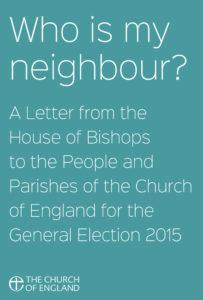 Less than two thirds of the population cast their vote in the last General Election in 2010. Less than half of under 25’s turned out to vote. People feel detached from politics.
Less than two thirds of the population cast their vote in the last General Election in 2010. Less than half of under 25’s turned out to vote. People feel detached from politics.
Our society needs fresh vision. We face different threats and problems at home and across the world. An election campaign is an opportunity for us to think hard, to debate and to have a conversation about what kind of world we want to build, about what kind of society we want to see.
On Shrove Tuesday, the House of Bishops issued a Letter to the People and Parishes of England for the General Election 2015. The full text is available online here: Who is my neighbour? Alternatively, click on the image to the right. I want to commend it for careful study and reflection in every parish.
The purpose of the letter is not to tell people how to vote. The purpose is to encourage all Christian people to engage with the election and to use our votes thoughtfully, prayerfully and with the good of others in mind.
The letter is also an appeal to politicians of all parties to raise the quality of the debate. We need our politicians to be people of integrity and to offer real leadership in uncertain times. Politics needs to rise above a series of promises to one or other part of the electorate to deliver a slightly better deal to some in terms of wealth creation, welfare or tax relief.
There are big issues at stake in this election: Britain’s role in Europe and in the rest of the world; the fairness of our society; the protection of the vulnerable; the size of the state, our care of the environment and the role of public services.
There are 16 Parliamentary constituencies within the Diocese of Sheffield including the seats of two of the current party leaders. The churches and other faith communities form a significant part of the electorate. We are present in every single community, we are engaged with urban and rural issues, with rich and poor, together we are making a vital contribution to the common good.
I will be writing to all the candidates in every constituency in the Diocese with a copy of the Bishop’s Letter and encouraging them to engage with the churches and faith communities and the issues they bring.
Please pray for the candidates and for the General Election. Please engage with the debate and conversation which the Bishop’s Letter has begun before and after 7th May. Please vote and encourage everyone you know to vote as well.
The Bishops’ Letter asks the question: “Who is my neighbour?” and holds out a vision that we will not build a society of strangers but a community of communities. That vision for our world is at the heart of the scriptures. Jesus himself teaches us to pray: “Your kingdom come”. Let us not neglect our responsibility as citizens and as Christians to engage with the debate around us.
+Steven Sheffield
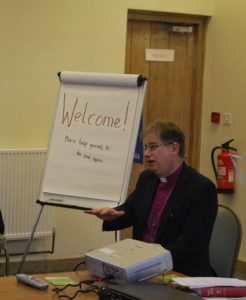 How should a Christian think and speak about climate change?
How should a Christian think and speak about climate change?
Climate change is a present reality not a future threat. It’s a present reality for millions of the poorest people in the world who are affected today by rising sea levels, by changing weather patterns, by water shortages and violent storms.
On Saturday, Hope for the Future offered a training day in Sheffield for Climate Change ambassadors. It was a privilege to be there. Hope for the Future is an ecumenical, nationwide campaign to encourage and equip individuals, churches and groups to lobby their MP on climate change. Further details are here: http://www.hftf.org.uk
2015 is a key year for Climate Change campaigners. Action to prevent climate change has to be global to make a difference. This year, there are a series of key international conferences and meetings. The UK has the potential to play a leading role in all of these, whatever government is in power. Now is the time for the churches to speak out.
The different aid agencies and charities have formed the Climate Coalition (http://www.theclimatecoalition.org). Big things are planned for Valentine’s Day in a couple of weeks time. Pope Francis is to issue a major encyclical later in the year. Christian Aid, Tear Fund, CAFOD and others are all mobilizing their supporters.
But what will move us to take action? One of the most helpful stories to reflect on the Good Samaritan (Luke 10). Almost everyone knows it. A man is travelling down from Jerusalem to Jericho. He is set upon by robbers and left for dead. Over 66% of the people who travel down the Jericho Road that day see the problem but they do nothing about it. They pass by on the other side.
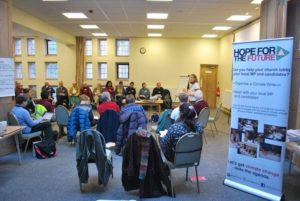 The Samaritan is different. He sees and is moved with compassion. Compassion moves him to action. That is exactly the journey many of us need to take in respect of climate change. We need to see what is happening and its consequences. We need to be moved with compassion. We need to take action: in campaigning for change, in changing our habits and in encouraging others to do the same.
The Samaritan is different. He sees and is moved with compassion. Compassion moves him to action. That is exactly the journey many of us need to take in respect of climate change. We need to see what is happening and its consequences. We need to be moved with compassion. We need to take action: in campaigning for change, in changing our habits and in encouraging others to do the same.
What helps people to make that change? Jesus tells the parable to answer a lawyer’s question: who is my neighbour?
Think about it. People in the Philippines, in Bangladesh, in Bolivia, in Malawi, affected by climate change today are my neighbours. The generation now being born, who will live through enormous climate trauma if we do nothing are my neighbours. To love them means to take action, to do something.
My full reflection on the Good Samaritan is available here.
For ideas on what action to take please go to one of the websites above.
Hope for the Future have partnered with Operation Noah to deliver a second training day in London on March 14th exploring our Christian call to climate action. This will include contributions from Bishop Richard Cheetham, Our Voices and CAFOD. More details on the website.


